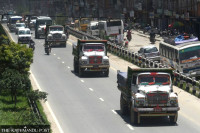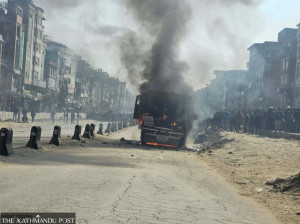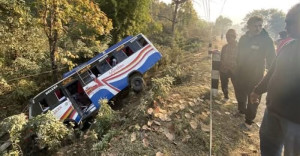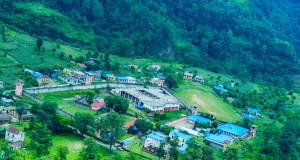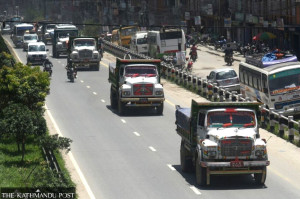Bagmati Province
Absence of agriculture technician in local units hits Makwanpur’s agriculture sector
Farmers in the district choose to cultivate cannabis and opium because they don’t know what type of food crops to grow in their fields, say farmers.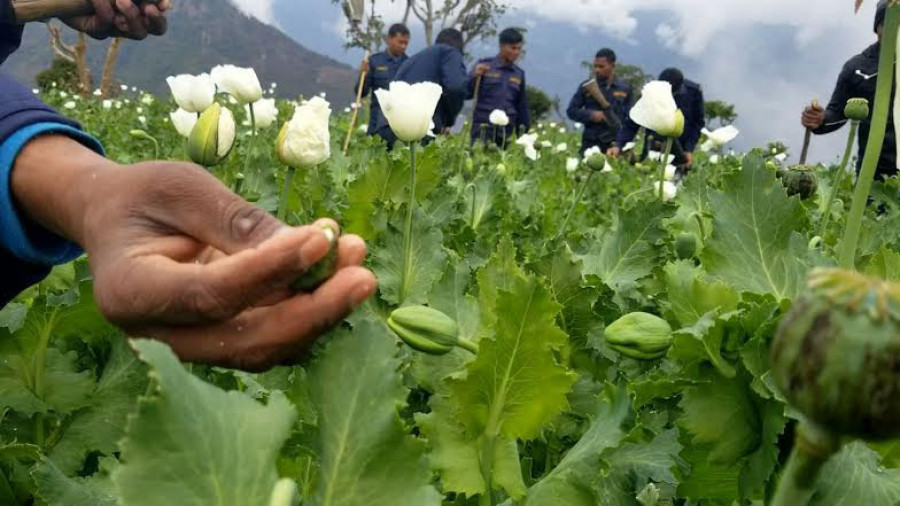
Pratap Bista
Reports of farmers in Raksirang growing poppy and marijuana plants in their fields have been doing the rounds of late. This growing practice shows the rise in the activities of drug smugglers, say police.
“Drug smugglers lure farmers into growing these crops with heavy returns. The farmers make good money from selling these crops to drug dealers,” said Sushil Singh Rathour, superintendent of police at the District Police Office in Makwanpur.
Meanwhile, farmers say they choose to cultivate cannabis and opium not only for the higher profit margin but also because they don’t know what type of food crops to grow in their fields. Every local unit has an Agriculture Technician Office which provides farmers with information on their field’s soil type, knowledge about the suitable type of crops to grow and nutrient deficiencies and fertiliser requirements of the soil. But in Raksirang, the department is defunct, said Arjun Thakuri, a resident of Raksirang Rural Municipality Ward No. 9.
Before turning to cannabis farming, Thakuri had visited the Agriculture Technician Office in the municipality to understand what kind of crops can be grown in his field. “I had gone there seeking advice and information from technicians. But there was nobody in the office. I returned home and sowed cannabis seeds,” said Thakuri. “I couldn’t leave my land barren and at that time, growing cannabis was the only option.”
A team of the District Police Office destroyed Thakuri’s marijuana field during the drive in January.
“We don’t want to cultivate cannabis and opium but how long will we leave our land barren?” said Thakuri. “I tried growing vegetables but the yield was poor and I ran into a huge loss. Since there was no help forthcoming from the technician’s office, I decided to make some money by growing cannabis.”
The rural municipality allotted around Rs 20 million under the agriculture heading in the current fiscal year, but seven months into the fiscal year, it has spent less than one percent of the budget. The budget is meant for agriculture and food insecurity but a lack of agriculture technicians in the municipality has curtailed the use of the budget.
Raj Kumar Malla, chairman of the rural municipality, said, “We haven’t been able to mobilise the agriculture budget this fiscal year, as we don’t have agriculture technicians to help us move the process forward. The authority to hire agriculture technicians does not lie with the local unit.”
The federal and provincial governments have not formulated laws that would enable local units to appoint agriculture technicians, said Malla.
“In the absence of agriculture technicians, we cannot encourage locals to embrace agricultural entrepreneurship. They don’t know where to start. That’s why they dabble in illegal farming of various drugs like cannabis and poppy.”
Contrary to Malla’s statement, Yogendra Bahadur Karki, the secretary at the Ministry of Land Management, Agriculture and Cooperatives, said the provincial government, after the adoption of federalism, only appoints agriculture technicians for the Agriculture Knowledge Centre and the Expert Centre. The local unit itself should fill local-level posts like that of agriculture technician.
“The local units should appoint technicians on a contract basis from their own budget,” said Karki.
There were three technicians in the Agriculture Technician Office of the rural municipality last year, but the federal government withdrew them under the Employee Adjustment Programme. The posts have remained vacant since the technicians’ transfer at the end of the last fiscal year.
Highlighting the need to expedite the hiring process of agriculture technicians in the local unit, Malla said, “The agriculture sector must be prioritised and the first step to doing that is to bring in agriculture technicians in the rural municipality.”
There are 10 local units in Makwanpur and most of them are currently facing a shortage of agriculture technicians. Kailash Rural Municipality has only one agriculture technician and he rarely conducts inspections for lack of human resource in the office, said Tanka Bahadur Moktan, chairman of the rural municipality.
Ekraj Uprety, chairman of Manahari Rural Municipality which is also without an agriculture technician, said he understands the importance of modernising agriculture trends and adopting scientific methods to enhance productivity, but the rural municipality does not have technicians to help farmers materialise that goal.
.




 9.83°C Kathmandu
9.83°C Kathmandu
